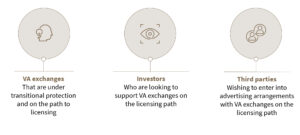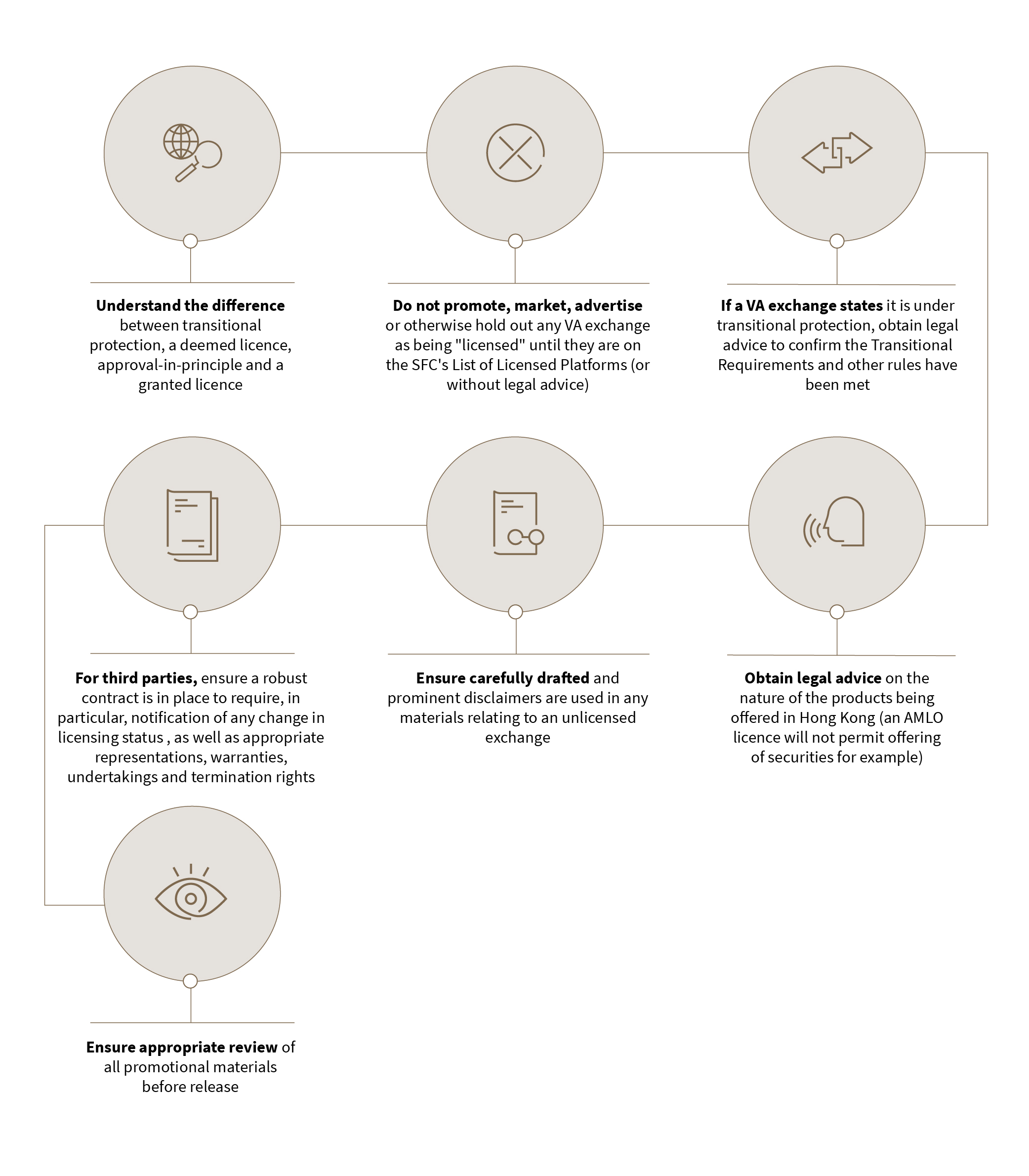Just three months. That’s how long it took for the Securities and Futures Commission (SFC) to use new powers to publicly name and shame a virtual asset (VA) exchange. Known as “JPEX” , the unlicensed crypto exchange was warned about potential breaches of the licensing regime that commenced on 1 June 2023.
The warning accuses JPEX of committing the criminal offence of actively marketing its products and services to the Hong Kong public without a licence. The warning also takes aim at media influencers, “key opinion leaders” and over-the-counter (OTC) shops for facilitating said marketing.
On 18 September 2023, social media influencers, Joseph Lam Chok and Chan Wing, were arrested in connection with the JPEX warning for allegedly marketing JPEX’s products and services to the Hong Kong public. In total, six arrests have been made on suspicion of conspiracy to defraud.
Enforcement for non-compliance with the new Anti-Money Laundering and Counter-Terrorist Financing Ordinance (Cap. 615 of the Laws of Hong Kong (AMLO) regime has commenced while many exchanges are still busy preparing applications and before a licence under the AMLO has been granted to any VA exchange.
In this article, we summarise why JPEX has been issued with a warning and the potential pitfalls for the many, compliance focused, VA exchanges that are in the process of, or considering, applying for a licence in Hong Kong, and those wishing to support and partner with them.
What are the criminal offences?
As of 1 June 2023, it became an offence under the AMLO for a person to:
a) carry on the business of providing any VA service; or
b) hold themselves out as carrying on a business of providing any VA service,
unless licensed under the AMLO.
Further offences of relevance relate to:
i) directly or indirectly, in a transaction involving any VA:
(A) employing any device, scheme or artifice with intent to defraud or deceive, or
(B) engaging in any act, practice or course of business that is fraudulent or deceptive, or would operate as a fraud or deception;
ii) making fraudulent or reckless misrepresentations for the purpose of inducing another person to engage in VA transactions; or
iii) issuing an advertisement that holds out a VA exchange as being licensed where the person issuing the advertisement knows the virtual asset is not licensed as required.
Licence process
We have written extensively about the key concepts, requirements, process and timeline to obtain a licence under the AMLO (for our latest compendium of requirements, see here.
The key dates of relevance here are those that relate to what is known as the “transitional protection”, whereby a VA exchange will be under transitional protection until 1 June 2024 (or its licence is approved, rejected or withdrawn) provided that:
a) it was “operational” as at 1 June 2023, with the SFC having several expectations for this to have been met (“Transitional Requirements”);
b) it submits a compliant licence application to the SFC before 1 March 2024; and
c) the SFC has not issued a non-satisfaction notice before 31 May 2024.
Advertising, or referring clients to, a VA exchange under transitional protection is a thorny area. It is not as simple as checking a register – there are multiple (subjective) assessments that need to be made. The practical effect is that being under the transitional protection is not quite the same as holding an SFC licence, meaning partnerships, banking relationships and advertising arrangements require care. In addition, the transition protection provisions in the AMLO only refer to a VA exchange that benefits from the protection of not contravening the requirement to hold a licence – it is otherwise silent in relation to the advertising ban on unlicensed VA exchanges.
To date, no VA exchange has been granted an AMLO licence. The first are not expected to come through until next year. Once a licence is secured, the licensed VA exchange will appear on the SFC’s list of licensed providers, clearly specifying that the VA exchange is AMLO licensed (“SFC’s List of Licensed Platforms”).
Earlier this year, the SFC fired a warning shot for exchanges professing to have lodged applications (see here). But its latest action demonstrates the ongoing need to balance the very strong (positive) Web 3 messaging from the Hong Kong Government with education about the need for appropriate licences.
What does the JPEX warning allege?
JPEX has been on the SFC’s alert list since July 2022. The latest warning, issued on 13 September 2023, states that JPEX has been actively promoting its products and services to the Hong Kong public through social media influencers and key opinion leaders as well as OTC VA money changers.
The warning sets out the SFC’s intention to “make it clear that no entity in the JPEX group is licensed by the SFC or has applied to the SFC for a licence to operate a [VA exchange] in Hong Kong.”
The warning further:
a) advises against investing in products offered by JPEX;
b) refers to very high returns being offered for some of its products, with products such as deposits, savings and earning products being available; and
c) warns that retail investors have been unable to withdraw their VAs or have suffered losses.
The warning also refers to JPEX having publicised a partnership with, and investment from, a Hong Kong listed company, when in fact, according to the SFC, the cooperation has already been terminated and no investments were actually made by the listed company.
The key opinion leaders and OTCs are alleged to have made false or misleading statements on social media to suggest that JPEX has applied for a VA exchange licence in Hong Kong, either independently or in partnership with a Hong Kong listed company, when this was not true. The SFC has instructed such entities to cease doing so.
What are the key learnings for exchanges, investors and advertisers?
Setting aside JPEX’s assertions and practices, the most significant aspects of this warning having been issued, is the message it sends to the following key entities:

In this case, a listed company appears to have considered (to some extent) investing in a VA exchange. Whilst it has not done so, perhaps after conducting some level of due diligence, it has been held out as having done so.
Further, influencers, “key opinion leaders” and OTCs have, either knowingly or recklessly made false statements regarding the licensing status of JPEX, and have now received a slap on the wrist for doing so.
The ramifications for both the listed company and the promoters could have been far worse, noting the potential criminal consequences.
The good news is, there are numerous reputable and compliance driven exchanges in Hong Kong (we know, we work with them) going through the licence process diligently and methodically. There are ways to disclose that a licence is being sought lawfully and plenty of partnership opportunities out there.
Avoiding negative consequences requires careful compliance with the rules. In particular, we recommend at least the following steps:

Looking to obtain a VA exchange licence, or to partner with or promote a VA exchange? We have unrivalled industry knowledge in relation to VA service providers and SFC licensing. We are helping a number of exchanges through the process and are happy to share our many years of licensing expertise.
This post – like all our posts – is not legal advice. There are many complexities to this area of law. We would be delighted to provide any legal support you need.










